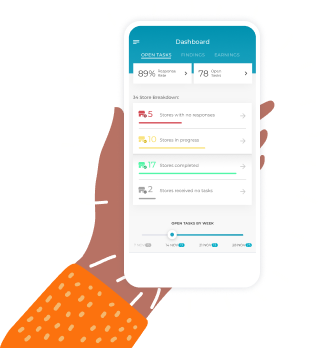Let’s talk silver linings. By now, we’re all familiar with both the serious devastation and annoying everyday inconveniences of life during a pandemic.
In addition to dispensing life-saving medication, pharmacies are often the closest place to grab a bottle of water or toilet paper. As a result, health retailers occupy a unique position in retail. Along with grocers, they’re the very definition of essential.
Naturally, both grocers and health retailers are thriving during the pandemic. According to an April NRF report, health and personal care stores are seeing a much-needed lift, with sales up 4.3 percent month-over-month. This less than a year after three major chains (CVS, Walgreens, Duane Reade) were closing underperforming stores and grasping for new strategies to bring visitors through their doors.
It’s not mere chance that health retailers are seeing a bump in sales as a result of the pandemic. The industry is stepping up in response to the crisis, taking drastic action to maintain a critical service, while ensuring the safety of their workforce and customers. Thankfully, many of the operational changes pharmacy retailers are making now will help them thrive in the long run. Here are the most promising changes they’re making.
Drone Deliveries
On one hand, a tiny helicopter delivering cough medicine from CVS is absurd. On the other, it also makes total sense during a pandemic and is happening right now. CVS, in partnership with UPS, has started delivering prescription medicine to the largest retirement community in the US. The first flights will travel less than a half-mile to The Villages, a community in central Florida with more than 135,000 residents, delivering prescriptions from one CVS store to a landing zone at the residence. After that, a ground vehicle will deliver prescriptions to individual homes.
Drone delivery is a prime example of an operational change made necessary by Covid-19 that should stick long term. Shoppers love easy. Retailers love making shopping easy, but it’s not always possible to offer convenience and stay profitable. Drone delivery could be a big winner on both fronts. Sure, there are advantages and disadvantages to using a drone vs. a traditional delivery driver or self-driving car. But in many areas, drones will be able to complete deliveries in a fraction of the time it would take a car fighting through traffic.
The novelty of drones dropping off M&Ms and allergy medication will eventually wear off. Still, the convenience will remain appealing to many segments of the population. For busy families with little ones in tow, drone delivery is a hassle-free no-brainer. For people enduring frigid winters, a short walk to the front door in sweats to collect a Rite Aid drone delivery has infinitely more appeal than bundling up for a cold slush-filled trek to the closest pharmacy.
BOPIS… at last.
For shoppers, time moves differently in a pharmacy. 2 minutes in line at Duane Reade feels like 5 minutes at Whole Foods. Maybe it’s a matter of expectations. You expect a grocery run to take a while and plan accordingly. By contrast, you pop into a pharmacy for a quick trip to snag your ready-to-go prescription and a handful of things (batteries, shampoo, Nyquil). Sometimes you breeze in and out. Other times, you’re waiting an eternity because there’s only one cashier or the self checkout line is filled with struggling masses.
What was a minor annoyance before Covid-19 is now a more serious problem. No one wants to be stuck in a confined space with others who are awaiting prescriptions (read: are potentially sick). Buy Online Pick Up In Store (BOPIS) is a natural solution that health retailers have been slow to offer, even as other retailers are reaping the benefits.
Pharmacies, in fact, had a multi-decade head start on their peers in rolling out some version of click-and-collect (i.e. BOPIS) in the form of drive-thru pickup. The first drive-thru pharmacy, P&S Pharmacy, made its debut in 1971 in Norman Oklahoma. Tuck that tidbit away for obscure pharmacy trivia night. Since then it’s been fits and starts, with Walgreens launching a prescription-only drive through in 1992.
Then Covid-19 hit and the pace of evolution picked up rapidly. In late March, Walgreens expanded drive-thru service. Shoppers could add a list of select staples to their prescription pickup. But they could only do so by asking the pharmacist at the window if these items were available. The pharmacist could then fetch those items, but only if there were no lines at the counter. Also, the service was only available on days of the month that were divisible by six (kidding, but only about that last part).
Now, just a few short weeks later, Walgreens is bringing the magic of BOPIS to a neighborhood near you. This time around, the experience is much simpler. Order online. Pick up at the drive-thru. That’s it. No restrictions.
There are other ways in which Covid-19 is creating a testing ground which could give birth to more convenient versions of health retail. Last summer, Rite Aid partnered with Amazon to offer in-store pickup via Amazon Lockers. Consumers are getting used to click-and-collecting at pharmacies. If you’re CVS, Rite Aid, or Walgreens why not give Amazon the boot and install your own lockers for all non-prescription purchases? During a pandemic, that could save the inside of your store (and maybe even your drive-thru) for those who may want to speak with a pharmacist, while offering less human contact and more convenience to everyone else.
Telehealth
Forget about retail for a second. Forget about the pandemic. How many times have you wanted to talk with a health professional about an ailment only to instead go down a WebMD rabbit hole? We all know where that journey ends: convincing yourself you have a horrible disease. Telehealth was supposed to be a viable alternative to going down this path but didn’t take off… until now.
Why the change? The US healthcare system has gaps, which have only widened during the pandemic. Patients with chronic conditions like hypertension and diabetes are delaying routine care. While doctor’s visits for conditions like these are routine in that they happen regularly, they’re also critical to keeping diseases at bay. Thousands of elective surgeries, many to ease painful conditions, are postponed or cancelled. Others who have access to care are scared to expose themselves to risk by visiting a doctor’s office. It’s no wonder that CVS Minute Clinic, Rite Aid’s RediClinic Express, and Walgreens’ Find Care Now are surging. These platforms connect patients with doctors and nurses to deal with common illnesses, injuries, mental health services, and chronic-condition management.
How big of a surge are we talking about? According to CVS CEO, Larry Merlo, the use of telehealth and virtual visits are up 600% year-over year. Merlo expects this trend to stick long term. You can also attribute the growth of telemedicine to state governments relaxing restrictions and regulations to give health care providers flexibility in fighting Covid-19. Although these services were on the rise before the pandemic, health retailers are adding additional features and providers in response to the crisis. Walgreens Find Care platform now includes a Covid-19 risk assessment powered by a Microsoft Healthcare bot and a wider selection of telehealth providers.
A New Normal
“We are seeing a new normal emerge and in the new future there will be an evaluation point of what worked and what didn’t,” Merlo said, “and as a result, we expect elements of today’s new norm will become part of tomorrow’s everyday routines.” Merlo was talking about telehealth and pharmacy deliveries, but his words ring true for all of the operational changes and innovations health retailers are now rolling out.
This pandemic will end eventually. When it does, you may find that the once-challenged health retail sector will be a critical element of the greater health care system. By providing local, community-based care, and an easy destination for everyday staples, the industry will continue to thrive.




